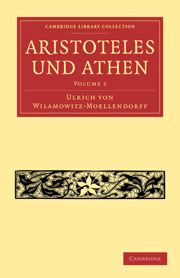Book contents
- Frontmatter
- Contents
- ZWEITES BUCH. Untersuchungen auf grund der aristotelischen Politie
- DRITTES BUCH. Beilagen
- 1 Die phratrie der Demotioniden
- 2 Der erste krieg mit Aegina
- 3 Die chronologie der pentekontaetie
- 4 Solons gedichte
- 5 Die attische skoliensammlung
- 6 Pindaros siebentes pythisches gedicht
- 7 Der process der Eumeniden
- 8 Die zeit der Thesmophoriazusen
- 9 Die rede für Polystratos
- 10 Die paragraphe und Lysias wider Pankleon
- 11 Lysias wider die kornhändler
- 12 Isokrates Panegyrikos 100–114
- 13 Die briefe des Isokrates
- 14 Demosthenes prooemium 55
- 15 Die gedichte des Aristoteles
- Sachregister
4 - Solons gedichte
Published online by Cambridge University Press: 10 November 2010
- Frontmatter
- Contents
- ZWEITES BUCH. Untersuchungen auf grund der aristotelischen Politie
- DRITTES BUCH. Beilagen
- 1 Die phratrie der Demotioniden
- 2 Der erste krieg mit Aegina
- 3 Die chronologie der pentekontaetie
- 4 Solons gedichte
- 5 Die attische skoliensammlung
- 6 Pindaros siebentes pythisches gedicht
- 7 Der process der Eumeniden
- 8 Die zeit der Thesmophoriazusen
- 9 Die rede für Polystratos
- 10 Die paragraphe und Lysias wider Pankleon
- 11 Lysias wider die kornhändler
- 12 Isokrates Panegyrikos 100–114
- 13 Die briefe des Isokrates
- 14 Demosthenes prooemium 55
- 15 Die gedichte des Aristoteles
- Sachregister
Summary
Aristoteles hat uns gelehrt, dass Solon in einer elegie die grundsätze dargelegt hatte, zu deren durchführung ihm seine wahl zum archon die macht gab. das gedicht gieng von einer selbstbetrachtung aus ‘ich erkenne mit schmerzen, dass die älteste Ionierstadt – dem abgrunde zutreibt’, nicht anders können wir den schwer verständlichen gedanken des ersten distichons ergänzen.) wir erfahren weiter, dass im eingange des gedichtes Solon ‘habsucht und übermut’ der herrschenden classe geisselte und später diese direct anredete: ‘bescheidet euch; denn wir dulden das nicht mehr, und nicht alles wird euch gefüge sein’. da in der allgemeinen charakteristik gesagt wird, dass Solon ‘für beide wider beide stritt’, erschliessen wir, dass er in entsprechender weise auch die besitzlosen und ihre begehrlichkeit in directer ansprache gegeisselt hat. das ganze war also eine volksrede in versen. wer elegie und iambos sich genauer ansieht, wird allerorten die directe ansprache vorfinden und dem entsprechend bemerken, dass die führer des volkes oder kleinerer kreise in Ionien die dichter sind. in Sparta redet der repraesentant des standes zu dem heere: das ist der charakter der tyrtaeischen verse, auf deren verfasser also nichts ankommt. für das verständnis der ionischen poesie ist die anerkennung der persönlichen ansprache durch die als solche bedeutende person die wichtigste vorbedingung. Es liegt nahe, reste derselben wichtigen elegie unter Solons fragmenten zu suchen, und vier verse (fgm. 15 Bergk) hat ihr Br. Keil mit grosser wahrscheinlichkeit zugewiesen.
- Type
- Chapter
- Information
- Aristoteles und Athen , pp. 304 - 315Publisher: Cambridge University PressPrint publication year: 2010First published in: 1893



